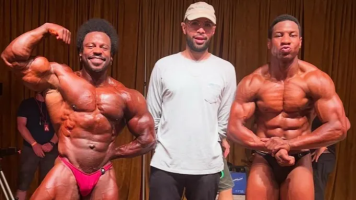FrenzyMaster
Mecca V.I.P.
VIP
Author
- Joined
- Jan 23, 2025
- Messages
- 112
- Points
- 18
Yo, what’s up, fam—FrenzyMaster here, your go-to guy when it comes to muscle, mindset, and the madness in between. Today, we’re diving into something really intense. Let me hit you with this question right out of the gate:What does it really cost to chase the “perfect” body? We’re talking about a film that goes deep into that question—Magazine Dreams, starring none other than Jonathan Majors. He isn’t your typical underdog-lifter-wins-the-crown movie. Nah. This one pulls back the curtain on the pain, pressure, and obsession that live inside the bodybuilding world. It’s raw. It’s uncomfortable. And man—it hits hard.

The Film at a Glance
Alright, let’s break it down—Magazine Dreams isn’t just about big muscles. It’s a psychological slow burn. Majors plays Killian Maddox, an amateur bodybuilder grinding for recognition while dealing with some serious emotional and mental struggles. He’s not the charming gym bro—we’re talking about a socially isolated, obsessive man who’s chasing validation through the pump.Without spoiling too much, you’ll see him go through highs and lows, not just in the gym but in life. This dude is constantly fighting against society, against judgment, against himself.
Critics at Sundance and Cannes were shook. People walked out of the theater in silence. Some praised it as a genius; others said it was too heavy. But everybody agreed—Jonathan Majors gave a performance that ripped the soul open.

Majors’ Physical and Emotional Transformation
Now, let’s talk about the gains. Jonathan Majors went all-in for this role. I mean, you can’t fake that kind of size—he bulked up like a monster.Reports say he was doing two-a-days, strict meal plans, and the whole bodybuilding lifestyle. No green screens here—the dude built a real physique to match the character's obsession with size.
But the real weight? That came from the emotional grind. In interviews, Majors admitted this role took a toll on his mind. He had to live inside Killian’s pain—feeling the isolation, the rejection, the constant fear of not being “big enough.” It’s one thing to lift heavy—it’s another to carry that kind of emotional baggage day in, day out.
Majors said he wanted to show the human beneath the mass. And believe me, he did. He didn’t just look like a bodybuilder—he became one, mentally and physically.
Bodybuilding Culture Under the Microscope
Now, here’s where it gets real, folks. This film isn’t just storytelling—it’s a mirror held up to bodybuilding culture. If you’ve spent time in the gym grind, you’ll recognize a lot: the endless bulking, the body checking, the mental tunnel vision. And yeah—the dark stuff, too.It digs into the harsh truth: Steroid use. Body dysmorphia. Emotional burnout. Stuff that doesn’t make it into the Instagram captions.
You see Killian pinning hormones, not for performance, but out of desperation. You see, Major obsesses over symmetry, ignores injuries, and collapses emotionally. For many lifters, that hits close to home. And honestly, this film might be the first to really capture what it feels like to be trapped inside your pursuit of perfection.
Social Commentary and Themes
Here’s the deeper layer—this film isn’t just about bodybuilding. It’s about hypermasculinity, about how men are taught to show strength but never struggle. Killian isn’t chasing a trophy—he’s chasing validation in a world that only respects muscle, not vulnerability.It also asks: where’s the line between discipline and destruction? When does the grind stop being about bettering yourself and start becoming a slow-motion self-harm?
There’s also a jab at society itself. We praise the aesthetics; we love the photos, but we don’t check in on the minds of the men underneath. This film calls that out.
Why The Magazine Dreams Movie Matters
This movie matters, plain and simple. Not because it’s artsy. Not because it’s edgy. But it finally tells a truth about bodybuilding that a lot of people are scared to say out loud.It shows how the obsession with being “perfect” on the outside can wreck you on the inside. It gives a voice to lifters who suffer in silence. And it opens up real conversations about men’s mental health, especially in spaces where people see emotion as weakness.
Jonathan Majors didn’t just play a role—he dropped a heavy dumbbell on society’s lap and said, “Look at this.” Whether you’re a casual lifter or a competitive bodybuilder, Magazine Dreams is gonna make you think about why you train, who you’re trying to impress, and what you might be sacrificing in the process.
Frequently Asked Questions
Is this movie only for bodybuilding fans?Not at all. While lifters will relate deeply, anyone interested in human psychology, pressure culture, and self-image will get something out of it.
What makes this role different from other fitness-focused movies?
Most gym movies glorify the hustle. This one questions it. It explores the pain beneath the pump, and that’s what makes it unforgettable.
Can this film change how people view bodybuilding?
Absolutely. It opens the door to real conversations about mental health, obsession, and how we define strength, not just in the gym but in life.














